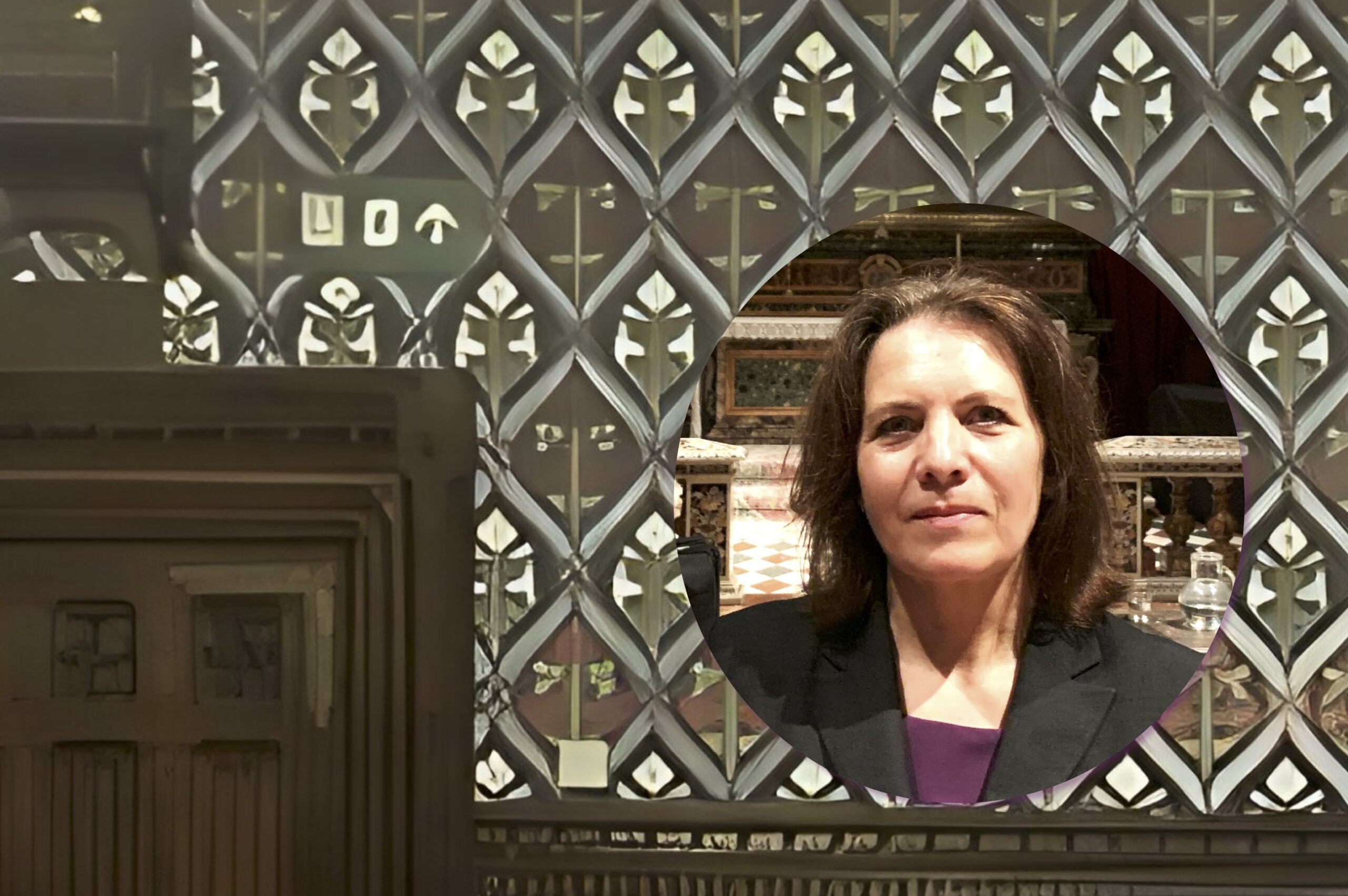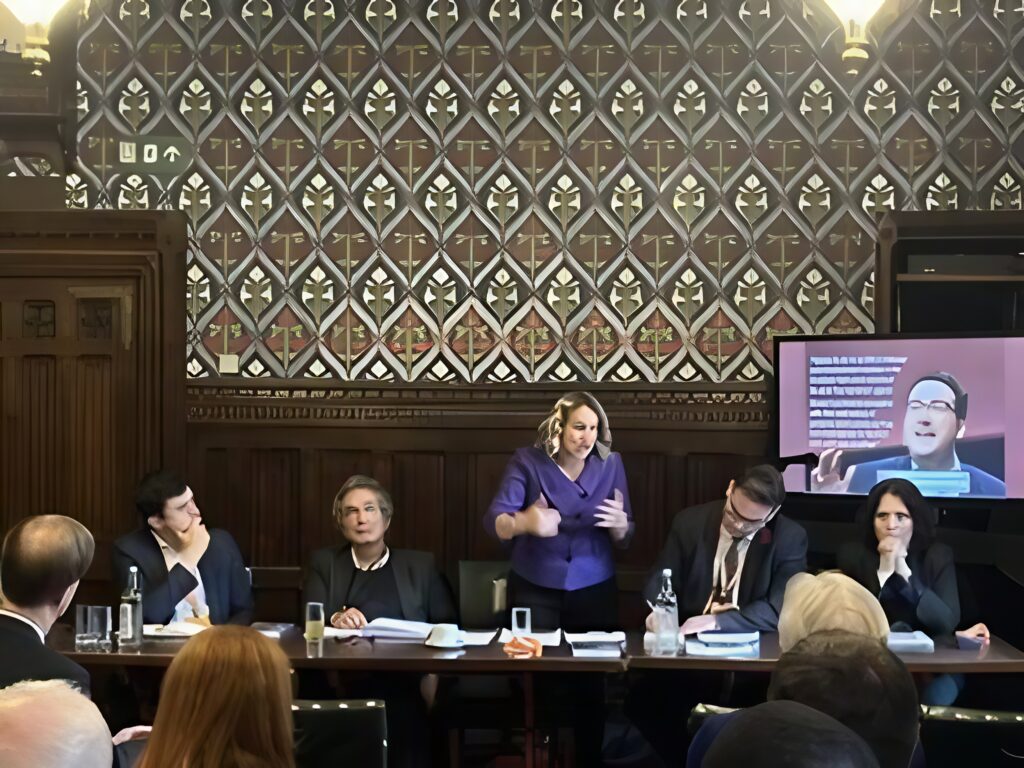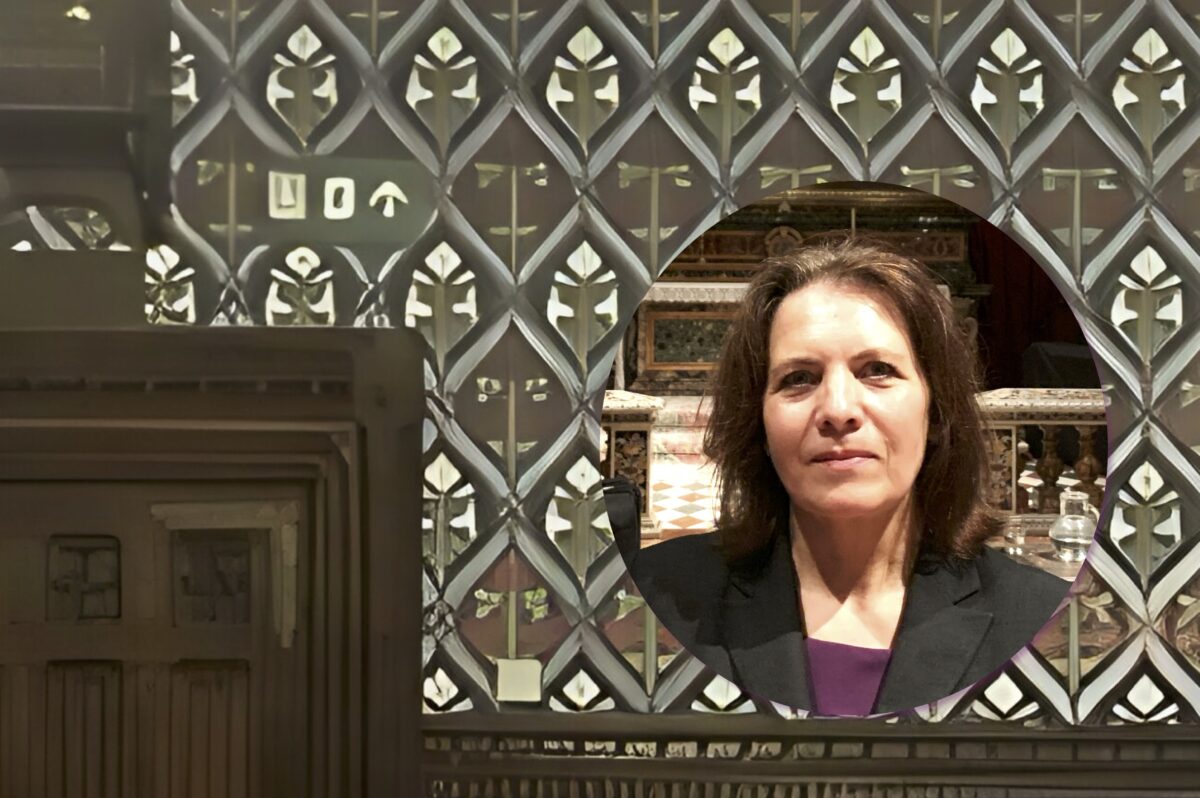
A 12 minute talk by Jenny Sinclair, given as part of a panel event to celebrate the publication of “Faith, Politics and Belonging” by Ian Geary. The panel (pictured left to right) featured Josh Nicholson, Lord Glasman, Suzy Stride, Ian Geary and Jenny Sinclair. Also Rachael Maskell MP (not pictured). The event was hosted by Rt Hon Stephen Timms MP. Sadly we do not have permission to share the full recording. Held on 31 October 2024 in the Jubilee Room at the House of Commons, London.
LISTEN to Jenny’s 12 minute talk HERE | Read her text below or DOWNLOAD HERE
The Common Good: A Better Story
I’m going to explore two themes from Ian’s book – liberalism and the common good. And I hope to show why the common good is so important.
Now, there’s no such thing as a neutral world view. That’s first thing to say. And just to share with you, the position I’m coming from is from the tradition of Catholic social thought[1], along with other influences I’ve picked up along the way.
Catholic social thought is intended as a gift to all people of good will. You don’t have to be a Catholic to use it, to draw on its framework. It began as a response of the Church to the impact of the Industrial Revolution on human beings. Its concern is always what is happening to the human person and to God’s creation. It provides a theological framework for reading the world.
Now, every era is characterised by an animating idea. The animating idea of our era is liberalism. This is the sea we swim in. We don’t really see it because it’s all around us. And based on this idea, we get the idea of the “unencumbered self”, in which freedom is understood as freedom from constraint. Freedom from God, from family, from place, from tradition.
We’ve ended up with this paradigm of freedom of choice, with its greater emphasis on rights than responsibilities. And this liberalism shows up in both economic and social forms – we’ve got the neoliberal economic model on the right, and the hyper liberal social norms on the left.
But they’re driven by the same logic, where limits are framed as regressive. There’s a kind of blind spot going on. The right attribute moral unravelling to excessive liberalism, but somehow the neoliberal economic system gets a free pass; the left attribute poverty to the neoliberal system economic system, but they accept unlimited self-actualisation, which is seen as progressive.
The point I want to draw attention to here is that liberal anthropology is different from Christian anthropology. Christian anthropology sees us as we are – relational beings made in the image of God.
We’ve had a liberal consensus which has been shared by all parties for over four decades. This is the sea we swim in. We’re so used to it, we don’t notice it – but there are a lot of symptoms which, although connected, at first sight do not seem to be.
When we look at what’s happening to the human being and relationships, we see so many symptoms of human distress. We see the breakdown of trust, loneliness, exploitation, inequality, fragmentation, the commodification of creation.
This animating idea has also led to globalisation, deindustrialisation, the off-shoring of skilled work and the discarding of places and whole communities, especially in the so-called post-industrial working class communities. It’s also led to the imposition of the knowledge economy and the service economies.
Effectively, it’s been a power grab from the poor to the middle class and to the rich. The consequences have been devastating. The point to draw from this is that this type of neoliberal economy has an effect on human beings. It has an effect on our behaviours, on our relationships.
The theologian Luigino Bruni says, “the market gives birth to and fosters its own sense of being human” that “it engenders the promise of interpersonal relationships without the wound of the other.”[2]
Now, we all know the risk of relationship – when we open ourselves to the other. But without that, we’re not human.
It’s not an exaggeration to say that this philosophy generates an anti-human system. It makes us into the ideal consumer sitting at home ordering from Amazon, separated from each other. It’s an assault on relationship.
This is the same system that’s reshaped our conception of work. From vocation to low skill, low security jobs which weakens the confidence of the young in adulthood and undermines family formation. It’s also reshaped our conception of welfare, from community interdependence to the transfer of funds where you’re left on your own in your flat, surrounded by unpaid bills.
This makes people unhappy and lonely, especially the young. It weakens social bonds. It undermines local democracy. It promotes a false freedom: freedom of “choice”.
It leads to a loss, a loss of the human space where we can be together. This makes us vulnerable to exploitation and manipulation. There is a sense of dislocation. Our primary relationships ought to be with each other, not with the likes of Amazon, nor with the state.
Catholic Social Teaching critiques any system that dehumanises, whether it’s the unfettered market or the over-centralised, collectivist state. It’s also looking for ways of constraining those powers.
It says that we need to become awkward customers: borrow more, buy less, build up local institutions and the relationships between them. This layer of civil society is where human beings find fulfilment. Thankfully, some communities still have this, but many have lost it, and the loss is real. We need to be reminded what it means to be a neighbour. We need to build back mutual obligation and strengthen local relational power to resist the dehumanising forces.
So how do we do this?
The common good is the antidote to individualism and collectivism. It involves building relationship across differences at all levels. It’s a better story. But it’s also very practical.
In political terms, it’s about building relationship between labour and capital, between employer and employee, between business and unions. It involves local banking, and energy providers that are closer to people and more accountable. It involves a distribution of power and resistance against global governance.
It also means building back relationship where it’s been stripped out. Less of the auto checkout and more human contact. And in local terms, it means building relationships between the old and the young. The intergenerational is so important. It involves strengthening the family, local businesses and the links between neighbourhood institutions, and strengthening local associations.
We need to restore a memory of the commons. We need to join up decent work and skills training to enable young people to feel that they can build a life.
The church is really well placed to enable different groups to work together. To act together, to generate a local moral economy – a counterweight to the big corporates. To challenge structures of sin and to build structures of grace. To defend the interests of local people. Like in Isaiah 58:12, we’re called to be “Repairers of the Breach”. Because there has been a breach – a breach of the common good.
In particular, this is about solidarity with poor communities. We have to think about what solidarity actually looks like. It doesn’t look like being a service provider. The church is called to be incarnational: like our Lord, it’s about living in the local in relationship with people. The church is called to be much more than a service provider. It’s more about building reciprocity and supporting the leadership of people in those abandoned places.
This tradition of Catholic social thought is also very cautious about church-based charity becoming a handmade of the state. We’ve got to be very careful about this, especially now that government has so little money to work with. The church is going to be courted by the government – you know, “we really want you to help”. It’s very tempting to fall into that role. We’ve got to be very, very wary of filling in those gaps that the state has left.
At the same time, there are things that we really ought to be doing at community level that the state shouldn’t be doing. It’s about becoming more interdependent, about building that back into community, with a distinctive Christian charism.
In the face of this dehumanising philosophy, we’re not called to be useful, we’re called to be prophetic. This might mean being unpopular. Taking this position as a Christian in politics might be difficult. It might mean being countercultural to the prevailing narrative, on both the left and the right.
This false narrative of freedom leads us to target each other. But we need to get the right enemy – it’s not each other. The modern Pharaohs of our day are over-centralised state power and corporate power. These undermine human relationships. We are not enemies of each other. This is why identity politics is so toxic because it pits us against each other on the basis of identity and opinion.
There has been too much emphasis on rights and not enough on mutual obligation. We’re living in this fragmented story – a toxic story of false freedom – which is also a massive distraction from the fundamental problem: a dysfunctional political economy that generates poverty in all its forms.
As Christians we know that our anthropology is relational. Our concept of the person is not individualistic. Our role here – therefore our vocation – is to uphold and defend the human space. This is the reason for the common good.
The common good is not something you can impose. It’s not a utopian ideal. It’s something we build. It’s something we build together across our differences, much like Ubuntu – “I am because we are”. We are not complete without each other. This is why there’s so much human distress.
The common good is both a goal and a practice. It’s about building a shared life.
At Together for the Common Good, we work in four areas: we have a schools programme where we teach common good thinking to young people. We also equip leaders in churches and charities and other organisations. We address the big questions in public conversations – like social peace, the economy, the dignity of work, the future of Christian social action, which I’m working on at the moment. And in our podcast, Leaving Egypt we also try to tell a better story.
Jenny Sinclair
Founder and Director, Together for the Common Good
NOTES
[1] https://togetherforthecommongood.co.uk/about/catholic-social-thought
[2] Bruni, Luigino The Genesis and Ethos of the Market
To get hold of a copy of Ian Geary’s book, Faith, Politics, and Belonging: A Reflection on Identity, Complexity, Simplicity, and Obsession, go to https://www.faithpoliticsandbelonging.com/

Like what you are reading? More inspirational content from Jenny Sinclair can be found here: https://togetherforthecommongood.co.uk/news-views/from-jenny-sinclair

